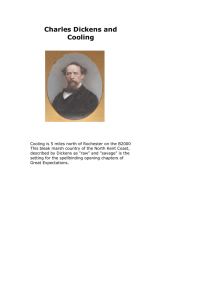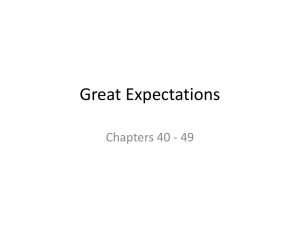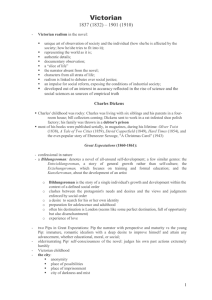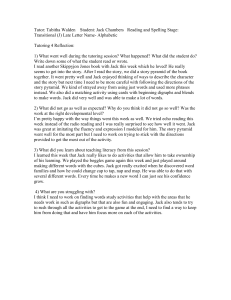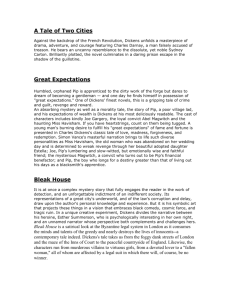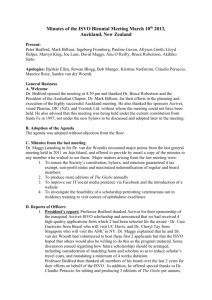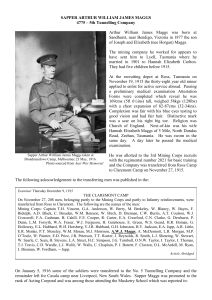Otto-Friedrich-Universtität Bamberg
advertisement
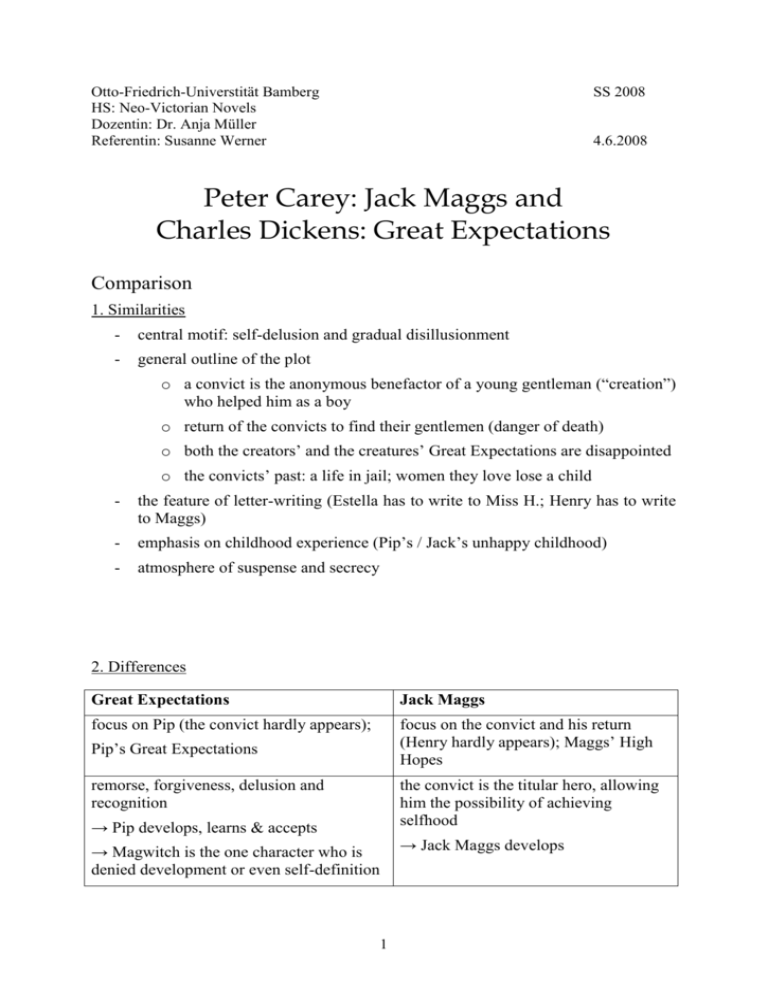
Otto-Friedrich-Universtität Bamberg HS: Neo-Victorian Novels Dozentin: Dr. Anja Müller Referentin: Susanne Werner SS 2008 4.6.2008 Peter Carey: Jack Maggs and Charles Dickens: Great Expectations Comparison 1. Similarities - central motif: self-delusion and gradual disillusionment - general outline of the plot o a convict is the anonymous benefactor of a young gentleman (“creation”) who helped him as a boy o return of the convicts to find their gentlemen (danger of death) o both the creators’ and the creatures’ Great Expectations are disappointed o the convicts’ past: a life in jail; women they love lose a child - the feature of letter-writing (Estella has to write to Miss H.; Henry has to write to Maggs) - emphasis on childhood experience (Pip’s / Jack’s unhappy childhood) - atmosphere of suspense and secrecy 2. Differences Great Expectations Jack Maggs focus on Pip (the convict hardly appears); focus on the convict and his return (Henry hardly appears); Maggs’ High Hopes Pip’s Great Expectations remorse, forgiveness, delusion and recognition the convict is the titular hero, allowing him the possibility of achieving selfhood → Pip develops, learns & accepts → Jack Maggs develops → Magwitch is the one character who is denied development or even self-definition 1 Magwitch: Jack Maggs: - name: Abel Magwitch (→ biblical fratricide, vermin and magic spells) - to magg = Victorian slang for to pinch, to pilfer - objectified into “the convict” - - strong physical presence → dehumanized (animal-like ferocity, association with cannibalism) mostly referred to by his proper name - same physical strength, but no dehumanization - ferocity → positive quality (power to command other people and to make him attractive to others → the homosexual footman falls for him, as well as Mercy) - an ignorant and determined man, driven by an idée fixe - stereotyped character of a savage criminal - an outsider longingly looking in upon the world he can never enter Literature Jordan, John O. “Dickens Re-Visioned: ‘Jack Maggs’ and the ‘English Book’.” Dickens: The Craft of Fiction and the Challenges of Reading. Eds. Rossana Bonadei et al. Bibiloteca di Anglistica: Collana di Testi e Studi. 5. Milan: Unicopli, 2000. 292-300. Letissier, Georges. “Dickens and Post-Victorian Fiction.” Refracting the Canon in Contemporary British Literature and Film. Eds. Susana Onega and Christian Gutleben. Postmodern Studies. 35. Amsterdam: Rodopi, 2004. 111-128. Schmidt-Haberkamp, Barbara. “Great Expectations.” Fabulating Beauty: Perspectives on the Fiction of Peter Carey. Eds. Andreas Gaile and Paul Kane. Cross / Cultures: Readings in the Post / Colonial Literatures in English. 78. Amsterdam: Rodopi, 2005. 245-262. Selles, Colette. “Heritage in Peter Carey’s Jack Maggs.” Commonwealth Essays and Studies 27.1 (2004): 63-75. Lexikon der Weltliteratur. Biographisch-bibiliographisches Handwörterbuch nach Autoren und anonymen Werken. Ed. Gero von Wilpert. Fremdsprachige Autoren A-K. 4th ed. Stuttgart: Kröner, 2004. Metzler-Lexikon Weltliteratur. 1000 Autoren von der Antike bis zur Gegenwart . Ed. Axel Ruckaberle. Volume 1. Stuttgart ; Weimar : Metzler, 2006. 2
